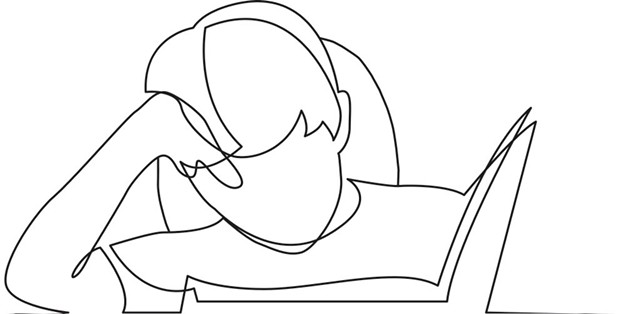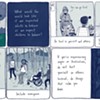Published October 29, 2019 at 10:00 a.m.
You know that song in Frozen where Anna and Elsa are getting ready for the ball, their first big social engagement since Elsa found out she had magical (and dangerous) ice powers?
The whole first half of the song features bubbly Anna, giddily singing about how many salad plates her family has been hoarding and how she can't wait to meet some "actual real-live people." And then, at the bridge, the tone darkens and Elsa's voice cuts through:
Don't let them in.
Don't let them see.
Be the good girl you always have to be.
Conceal, don't feel.
Put on a show.
Make one wrong move and everyone will know.
The first time I heard it, a chill ran down my spine. Oh God, I thought. It's my daughter, Joni. I spawned an Elsa! Afraid of her own power. Eager to please. Would probably lock herself in an ice castle if it meant she could keep her feelings to herself.
Like Elsa, Joni is an introvert. Quiet, thoughtful, careful. Full of deep, complex emotions she is highly skilled at concealing.
For the first five years of Joni's life, I thought she was my polar opposite. I considered myself an extrovert, charged up by interactions with other people. She was like her dad, a true-blue introvert who would often just rather be drawing. I thought it was my job as Joni's mother to help her see the world as I see it: full of interesting people waiting to be engaged in conversation.
Then, this fall, Joni started kindergarten.
It was difficult. Her teacher told us she was happy and thriving, but for the first couple of weeks she'd come home and come undone. Our loving, thoughtful, empathetic daughter would snap, and she'd become a violent, screaming monster. Her tantrums were frightening. And we felt powerless. So we made an appointment to see a family therapist.
It only took 50 minutes for the therapist to suss out the situation: Joni's a highly sensitive, highly intelligent introvert who is overwhelmed. When these kinds of kids hit their emotional limit, she explained, they flip their lid in an especially intense way.
She recommended reading Susan Cain's best-selling book Quiet: The Power of Introverts in a World That Can't Stop Talking.
When that book came out in 2012, it got a lot of press. I remember reading reviews and thinking, Cool, but this book isn't for me.
Then I read it.
Halfway through I found myself reassessing everything I thought I knew about who I am. Holy crap. I am not an extrovert at all. I am deeply introverted and always have been.
I was the kid who wouldn't talk to anyone but my closest friends. My idea of a fun activity was creating a card catalog for my book collection. I remember the flush of embarrassment I felt when my parents threw me a surprise birthday party in high school and invited half the school. How I wanted to disappear.
But I learned early, as many introverts do, that our culture rewards extroverts. And that if social ease and outspokenness don't come naturally, you can just fake it.
I faked it so well that by the time I was 36, I firmly believed it. I trained myself to always have something to say. I learned to be fun at parties. I built a fortress of faux confidence around my sensitivity.
Joni isn't different from me at all. I was Joni. I still am Joni, just with three decades of practiced social skills and a knack for cocktail parties.
After reading the book I felt such empathy for sweet, sensitive Joni, and for myself. I wanted to shout my revelation from the rooftops.
Instead, I got back to the book. Cain notes that introverts are better listeners, tend to think more before they speak and are less reckless than extroverts. She namedrops history-making introverts such as Eleanor Roosevelt, Albert Einstein and Rosa Parks.
The chapter about parenting an introvert is called "Raising introverted children in a world that can't hear them."
That struck a nerve. It took Joni almost a week to tell me why she didn't want to go back to the cafeteria to buy breakfast after the first time she did it.
There was a woman at the door whose job it is to check off the names of each kid who buys breakfast. She had asked Joni for her name, and Joni had likely mumbled it under her breath while looking at the floor. The woman couldn't understand her.
So instead of skipping back to her classroom, Joni had to stand there in the cafeteria, clutching her breakfast, while the lady found someone who could identify her.
The next week, when Joni and I approached the school, we were met with a swarm of sixth graders awkwardly thrusting high fives at us. Joni physically recoiled. It was all part of the school's well-intentioned inclusion campaign called "Start With Hello." But it was an introverted kindergartner's nightmare.
If I hadn't read Cain's book, I would have encouraged Joni to go for it. "Don't leave him hanging!" I would have probably said.
Instead, I held my tongue and we pushed our way through. We both breathed a sigh of relief when we arrived at the safe haven of her classroom.
Cain acknowledges that school can be the most stressful part of an introverted kid's life. When I pick up Joni at the end of the day, she is a zombie: glazed-over eyes and silent. In the first couple of weeks I peppered her with questions like, "Who did you sit with at lunch?" She wouldn't even make eye contact. I felt rejected and worried.
But one afternoon, after I'd finished the book, I picked Joni up from school. Her little sister, Frankie, and I were listening to — you guessed it — the soundtrack from Frozen. Joni hopped in the car and immediately doubled over and covered her ears. "I don't want to listen to this!" she shouted.
"But Frankie's in the middle of listening!" I would have said just a week earlier.
Instead, I thought about Joni. How all day she is watching and absorbing and trying to keep up with the voices of the hundreds of kids and teachers around her. How exhausting that must be. How when she sees me at the end of the day, she just wants to turn off and recharge.
"Joni needs some quiet time," I told Frankie, seeing the world at last the way Joni sees it. And I turned the music off.
This article was originally published in Seven Days' monthly parenting magazine, Kids VT.
More By This Author
Speaking of...
-

Summit Not Required: Reconsidering the Race to the Top
Aug 22, 2023 -

Use Your Words: A Mom and Early Childhood Educator Explains What She Learned About Managing Her Fear of the Climate Crisis
May 23, 2023 -

Rise and Shine? A Food Writer Navigates a Nauseous First Trimester
Feb 28, 2023 -

Use Your Words: To Cope With COVID-19, We Started a Business Together
May 17, 2022 -

Use Your Words: I Made a Kid. He's Pretty Cool, but 'Everything Hurts, and I'm Dying'
Feb 22, 2022 - More »
Comments
Comments are closed.
From 2014-2020, Seven Days allowed readers to comment on all stories posted on our website. While we've appreciated the suggestions and insights, right now Seven Days is prioritizing our core mission — producing high-quality, responsible local journalism — over moderating online debates between readers.
To criticize, correct or praise our reporting, please send us a letter to the editor or send us a tip. We’ll check it out and report the results.
Online comments may return when we have better tech tools for managing them. Thanks for reading.















































